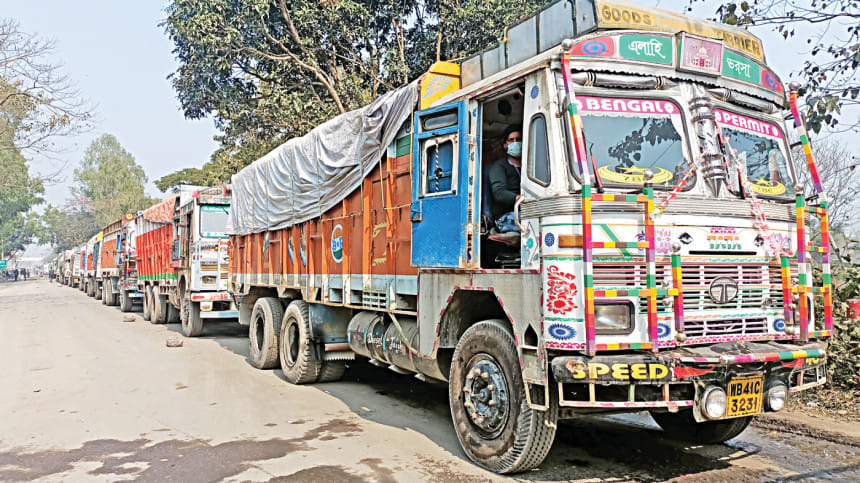Boulder rate row slows external trade through Burimari land port

Stone and boulder imports from India and Bhutan through Burimari land port in Lalmonirhat, the second-largest land port in Bangladesh, have been halted since February 1 due to price disputes.
However, the import-export trade of other goods, including fruits, dolomite powder, and gypsum from India and Bhutan, as well as jhut, garments, and biscuits from Bangladesh, is ongoing, albeit at a slower pace.
As stone and boulder imports have stopped, around 25,000 workers engaged in loading and unloading stones and crushing boulders have been plunged into unemployment.
Additionally, around 500 stone-crushing machines remain idle.
The Bangladesh Land Port Authority and customs officials said 80 percent of businesses at the Burimari land port depend on stone imports while the trade of other products accounts for only 20 percent.
Due to the halt in stone imports from India and Bhutan, the once-bustling land port now appears largely inactive, costing the government revenue worth around Tk 1.5 crore each day.
Mehedi Hasan, assistant director of the Bangladesh Land Port Authority at Burimari, told The Daily Star that an average of 10,000 tonnes of boulders and 800 tonnes of crushed stone were imported from India and Bhutan every day before February 1.
On average, 80-100 trucks carrying export goods left Bangladesh for India daily.
But now their numbers have dropped to 45-50. Similarly, 100-120 goods-laden trucks arrived from India and Bhutan daily, but the figure has now decreased to 50-60.
"Due to the price dispute, importers at Burimari land port are not importing stones, which is negatively affecting trade," he said. "Importers and exporters from both countries have been holding discussions daily, but no solution has been reached yet."
Anisur Rahman, a stone worker at Burimari land port, said that 20-30 workers are employed for each stone-crushing machine, with each worker earning Tk 500 per day.
"We have become unemployed as the grinding machines remain idle due to the lack of boulders," he said, adding that around 13,000 workers are engaged in stone crushing.
Maminul Islam, a loading and unloading worker at Burimari, said about 12,000 workers are engaged in handling goods, especially stones.
"We are in great trouble due to unemployment. We have to borrow money to survive," he added.
Noor Islam, a stone trader at Burimari land port, said there is a daily demand for 2.6 lakh to 2.8 lakh cubic feet of stones. Contractors and traders from different parts of the country buy stones from them.
He added that each tonne of a boulder produces 24 cubic feet of crushed stone. Every day, 15-20 tonnes of boulders are processed in each crushing machine.
"I have four stone-crushing machines, but they have been shut down since February 1 due to the halt in imports," he added. "We are unable to supply stones to contractors and traders."
Shah Alam, an LGED contractor in Lalmonirhat, said the price of stone has increased by Tk 20-25 per cubic foot at Burimari land port due to the import halt.
"Before February 1, I used to buy stone at Tk 110-115 per cubic foot. Since I need stone for construction, I am now forced to buy it at a higher rate."
Faruk Hossain, president of the C&F Agents Association at Burimari land port, said that stone exporters from India and Bhutan were charging $1-2 more per tonne of boulders, making it unprofitable for Bangladeshi importers.
"Despite requests to lower the price, exporters from India and Bhutan have not taken any action. This led to the halt in boulder imports," he said.
"As we are not importing stones, some Indian importers have also lost interest in importing goods from Bangladesh," he added. "We are continuing discussions to resolve the issue."

 For all latest news, follow The Daily Star's Google News channel.
For all latest news, follow The Daily Star's Google News channel. 



Comments